Juraj Sucharda, Businessperson, Slovakia
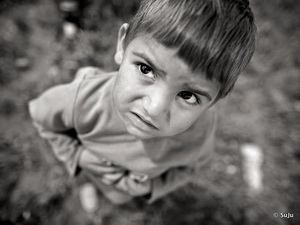 They live amongst us yet they live in their own world. Their community is their all and to be excluded would be too much to bear. They protect their privacy and are regarded as problematic citizens that are hard to get along with, being avoided by their neighbors as a result. We are talking about the Romany people, who, for unknown reasons, long ago decided to abandon India and wander to Europe, where they decided to settle and call it their new home. Their eyes sparkle with wildness and desire for adventure. But how do they really live? What are their concerns and how do their homes look? You can find the answers in today’s reportage created by Juraj Sucharda, who journeyed with his camera to places usually forbidden to ‘the white man’. (WoL)
They live amongst us yet they live in their own world. Their community is their all and to be excluded would be too much to bear. They protect their privacy and are regarded as problematic citizens that are hard to get along with, being avoided by their neighbors as a result. We are talking about the Romany people, who, for unknown reasons, long ago decided to abandon India and wander to Europe, where they decided to settle and call it their new home. Their eyes sparkle with wildness and desire for adventure. But how do they really live? What are their concerns and how do their homes look? You can find the answers in today’s reportage created by Juraj Sucharda, who journeyed with his camera to places usually forbidden to ‘the white man’. (WoL)
I am not sure if I am too confident within the social sphere of society. It was only when my wife started attending university, specializing in this subject matter, I unintentionally looked into it further. The right moment came not long ago, when we visited a community center near the city of Košice. A young man bid us welcome – a man of Romany decent, a classmate. The excursion followed right after a short conversation and, in my point of view, we crossed the borders into a whole different world inaccessible to many.
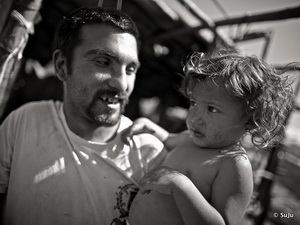 On the way to the settlement, I learned about the classic problems of finance, lack of support and understanding, the unwillingness of the government to help, as well as about the dreams, wishes and efforts to change the norms in this country. Initially, I wanted to document a Week of Life of one of the local mothers from the settlement, but the mentality and fear of the unknown forbid them (and me) to fulfill this idea.
On the way to the settlement, I learned about the classic problems of finance, lack of support and understanding, the unwillingness of the government to help, as well as about the dreams, wishes and efforts to change the norms in this country. Initially, I wanted to document a Week of Life of one of the local mothers from the settlement, but the mentality and fear of the unknown forbid them (and me) to fulfill this idea.
When we reached the crossroads on the way to the settlement, I have to admit I was worried, impatient but most of all, I had no idea what i got myself into. Luckily, we were accompanied by a guide; otherwise, I would have met with averseness rather than a warm welcome. I was immediately told a story of a photographer losing his equipment while touring the settlement.
The guide brought us to a small ‘house’ built from various bricks. The roof was hard to identify with tires all over it and everywhere you looked there was a pile of dirt along with surprisingly happy and satisfied children. A 35 year old lady greeted us with a toothless yet sincere and kind smile. She gathered together her 10 kids; I can’t remember the names, but their ages were between 9 months and 15 years. Our guide informed us that she is one of the few to use the intrauterine device, since she wouldn’t be able to afford any additional babies. Especially in a house with a 9m2 total area, despite the fact that based on the decree of the National Council of the Slovak Republic, NR SR 259/2008, the lowest standard of flats is supposed to be at least 12m2 per tenant and no less than 6m2 per every additional tenant. The useful floor space has to be at least 15m2. The luxury of a clean bathroom, heating and access to clean water is still only a distant wish; nevertheless, the children were clean and groomed. She invited us in and treated us with a cup of tea.
„The luxury of a clean bathroom, heating and access to clean water is still only a distant wish; nevertheless, the children were clean and groomed.”
We entered the cozy dwelling, which was clean and tidy, opposite to what I’ve imagined. Beds were made, pajamas aligned in piles, tea cups on the shelves with handles facing the window and the soup was boiling on the stove. At that moment, our baby girl started to cry and my wife had to take her out of the stroller and breast feed her right there in the house – our hosts reacted immediately and addressed a question our way: ‘Even white people have kids now? We realized how well off we are and continued further in the excursion.
We indulged into another conversation with the guide and found out more about the community as a whole. I asked why the children weren’t at school and the guide answered right away: ‘The oldest girl has already finished compulsory education, now she is waiting for an eligible groom. And the younger kids are waiting for afternoon classes, since the local school does not have the capacity for everyone to attend the morning lessons. Funds haven’t been approved yet, despite the project waiting for ratification for several years now’. To answer another one of my questions, why they have so many children, our guide answered in a broad interesting manner: ‘They have failed to understand the concept of birth control, they have insufficient information and no one from the majority of the population cares – for example, arranging for a social worker to be present at hospitals, explaining to pregnant women the options they have (birth control, sterilization).’ ‘In 1972 for instance, due to the Romany minority negatively affecting the statistics regarding health of the population, Romany women were given an option to be sterilized in exchange for a ‘reward’ that was supposed to compensate for the mother’s stay at the hospital. This immediately evoked a negative response outside the borders of ČSSR.’
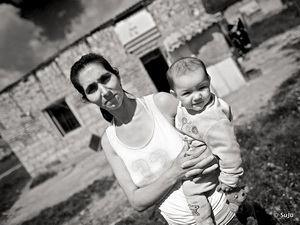 |
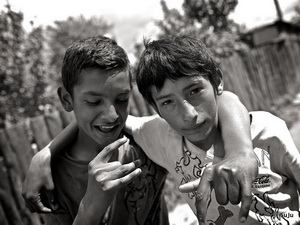 |
I kept asking and wondered about the coexistence of families, friends and children. I found out that the wife has to be 100% faithful, otherwise she becomes an outcast of the society. On the contrary, she is required to tolerate infidelity of her husband. When someone upsets them, they can get seriously angry, but afterwards, the conciliation is way more sincere. Moments after, we entered another dwelling. It was bigger than the previous one with a satellite above the doorway. The house was clean and on the bed, we saw a one year old sucking on milk.
The next stop was a trailer house. Here, we actually felt real poverty. The money they receive is spent on rice, flour, potatoes. Children primarily eat cookies from an oven, included in most of the dwellings. Based on proper paperwork, community centers supervise parents of children living in a foster house, check on projects, help the ones in need and so on. This is due to the fact that many of them only barely finished primary education, becoming dependent and in need of guidance in matters of organizing work within their settlements, handling legal affairs or abiding to school attendance, as well things they fail to understand and handle themselves.
„The wife has to be 100% faithful, otherwise she becomes an outcast of the society. On the contrary, she is required to tolerate infidelity of her husband.”
 |
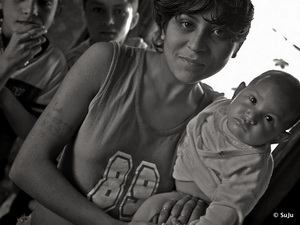 |
They require love, sensibility, understanding, rules and borders, because they are weak and heavily dependent. There are definitely exceptions; we aren’t all the same ourselves. Personally, this experience changed my perspective, my views and opinions. We need to take them by the hand like children and teach them to live, believe, love and protect.
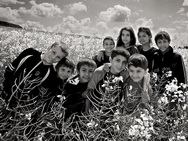 |
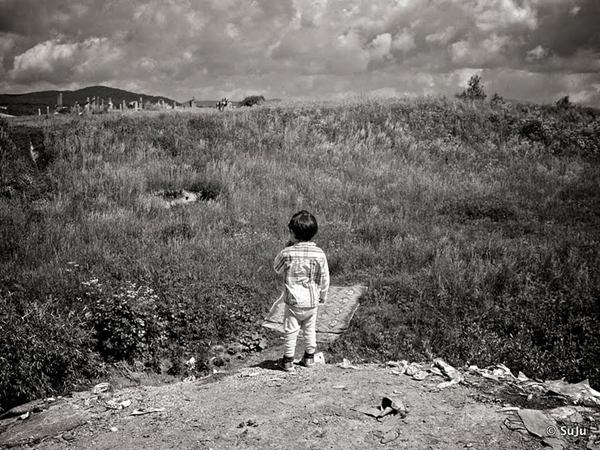 |
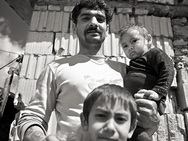 |
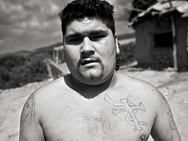 |
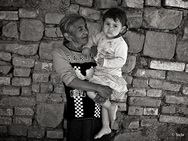 |
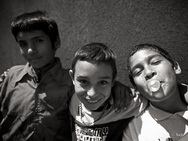 |
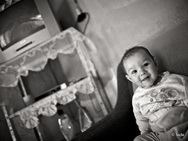 |
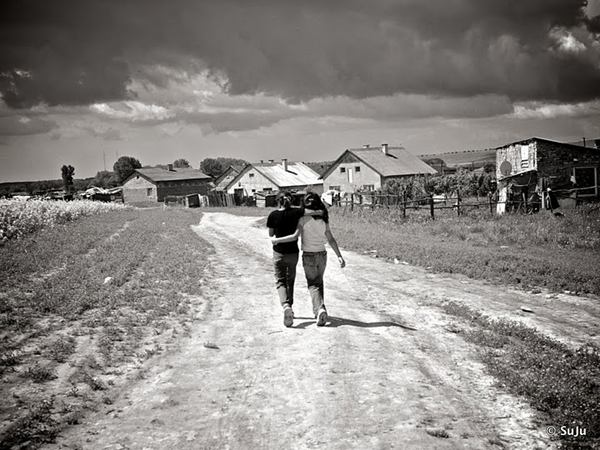 |
 |
